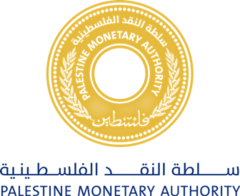Palestine Monetary Authority
 Logo | |
| Headquarters | Ramallah, Palestine |
|---|---|
| Established | 1994 |
| Governor and Chairman | H.E. Azzam Shawwa |
| Central bank of | Palestine |
| Currency | Jordanian Dinar, Israeli New Shekel and United States Dollar |
| Website |
www |
The Palestine Monetary Authority (PMA) (Arabic: سلطة النقد الفلسطينية)[1] is the emerging central bank of Palestine.[2] It is located in Ramallah, and is an independent public institution responsible for the formulation and implementation of monetary and banking policies, to safeguard the banking sector and ensure the growth of the national economy in a balanced manner. PMA aims to maintain monetary and financial stability and to promote sustainable economic growth through:
- effective and transparent regulation and supervision of banks, specialized lending institutions and money changers operating in Palestine.
- overseeing the implementation and operation of modern, efficient payment systems.
- development and execution of monetary policy designed to achieve price stability.
PMA is active in promoting financial inclusion policy and a member of the Alliance for Financial Inclusion. [3] It is responsible for setting monetary policy as well as overseeing the activity of regular banks (or "high street banks").
PMA operates by an act of the Palestine Legislative Council PMA Law Number (2) of 1997 which outlined the full authority and autonomy of the PMA and the Banking Law Number 9 of 2010.
The logo of the PMA pays homage to the Palestinian pound, minted and circulated under British occupation. The logo contains the name of the PMA in English and Arabic, written on the historic 5 Mils coin.
PMA vision
PMA’s vision is to be a full-fledged and a modern central bank for an independent and sovereign Palestinian state, capable of achieving monetary stability and keeping inflation under control, and maintaining financial stability, thereby, contributing to further development in the Palestinian financial sector, promoting integration into the regional and global economy, and ultimately, fostering high rates of sustainable economic growth in the Palestinian territories.
See also
References
- ↑ http://www.ifc.org/ifcext/media.nsf/content/SelectedPressRelease?OpenDocument&UNID=4E9F42888CF2E325852576B800553E5A
- ↑ "Archived copy". Archived from the original on 2012-03-15. Retrieved 2012-03-13.
- ↑ "AFI members". AFI Global. 2011-10-10. Archived from the original on 2012-02-20. Retrieved 2012-02-23.